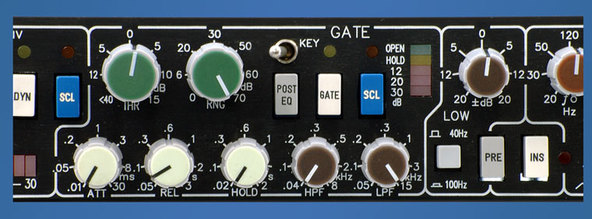Don't use them. Seriously. If you are an excellent engineer, there's no reason why you should have to use a gate, unless of course you are just really lazy or technically inept. Ouch. I know that might have hurt.
Ohhhh....Ok, Ok - There are some exceptions, and if you'll stick with me here and read the rest of this article, I'll point those out here in a little bit, but first, let's go over some common reasons why engineers use gates when they really shouldn't.
Ohhhh....Ok, Ok - There are some exceptions, and if you'll stick with me here and read the rest of this article, I'll point those out here in a little bit, but first, let's go over some common reasons why engineers use gates when they really shouldn't.
Excuse #1: I want to get rid of the hum and noise I hear in that channel when it's not being used, or I want to get rid of the noise I hear during the quiet sections of a song.
Answer: If you have allot of noise and hum coming through a particular channel, then it's time to fix what the issue is rather than putting a band-aid on the situation. It could be a bad cable, a noisy instrument with a bad ground, the musician is using the wrong type of cable (like a non-shielded cable) for their instrument, etc. Fix the issue. Repair it. If you don't know how to do that, then check out our section on Electronic Repair. In my opinion, if someone says they are an audio engineer, but have no idea how to at least perform basic repairs for common issues in audio, they are only fooling themselves. You should also know what type of cabling to use for what type of purpose.
Excuse #2: "You don't know what you are talking about because I use gates all of the time on kick drum, snares, and toms!"
Answer: Why? Have you really thought about that? You may say, "Because I don't want the other drums to bleed into one other." Yes, but you have to look at the drumset as one total instrument; not as a bunch of separate instruments put together. As an engineer (or at least the way I see it), your job is to present each instrument through the sound system (or recording) as close to how it would sound if you were standing next to it without it being amplified as it is being played. The sound of each tom will naturally ring out. Its "tail" would not be cut off in a natural situation. 2ndly - you may be worried about phase - but if you are not lazy, and know proper microphone placement, phase issues will not be a problem - and if something comes up, you'll know how to adjust the microphone to cure it! Seriously - let the drum microphones bleed into one another. A drumset should sound alive! A drumset shouldn't sound clinical and sterile.
"...you have to look at the drumset as one total instrument; not as a bunch of separate instruments put together."
It never fails. When an engineer sets up a gate on an instrument, notes are going to be missed because you have to set the threshold strong enough not to be set off by neighboring instruments. For instance, take a tom. You have to set it to open even on the softest of hits, but then the bleed from hitting other drums will inevitably open the gate on that one channel as well.
Exceptions:
1. Live Music Festivals - You are engineering at a festival where bands are setting up different instruments and microphones at record speed and you are left with what you have. In those cases, you are just trying to survive and get through each set. You don't have the time to figure out one little noise issue. In this respect, the engineer is not being lazy, but rather is dealt with a particular hand he/she can do little about. Your best hope in this case is to do the best you can with what you have. Things like having a pre-arranged stage plot can do allot to help. An example could be that you can locate the electric guitar amps to where they are not blaring into the drum overheads. Or, you can make use of more cardioid and super cardioid microphones for more separation and off axis rejection to keep bleed to a minimum.
2. Heavy Metal Dudes - Metal guitar gods in high-gain situations are bound to have some hum and hiss going on. A gate can really help to quiet allot of that. Even if they are running instruments that are well maintained and they are using the right kind of cabling, noise can still be an issue in these situations. This can be due to noisy guitar pedals or amplifiers.
3. You Get What You Get - You are a mix engineer, and there is no option to re-track an instrument on a recording from another studio you are tasked to mix. Sometimes you can use plugins or hardware (like cedar) to treat noise issues in a recording, but there's usually a tonal tradeoff. Sometimes a gate can be just what the doctor ordered.
4. Gated Verb - Some folks are after that sound. Some times it can sound really cool in the right situation. Here's how to do it.
3. You Get What You Get - You are a mix engineer, and there is no option to re-track an instrument on a recording from another studio you are tasked to mix. Sometimes you can use plugins or hardware (like cedar) to treat noise issues in a recording, but there's usually a tonal tradeoff. Sometimes a gate can be just what the doctor ordered.
4. Gated Verb - Some folks are after that sound. Some times it can sound really cool in the right situation. Here's how to do it.


